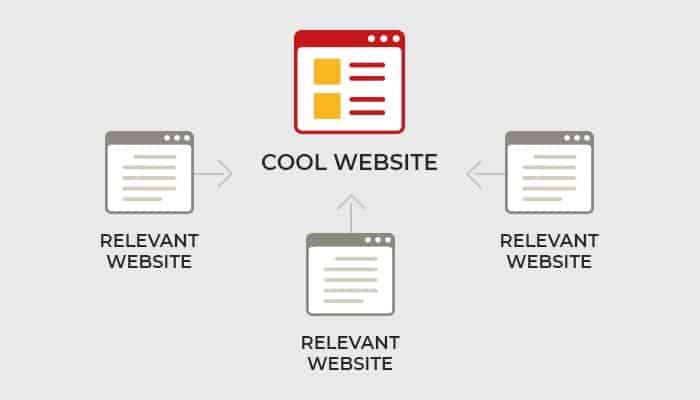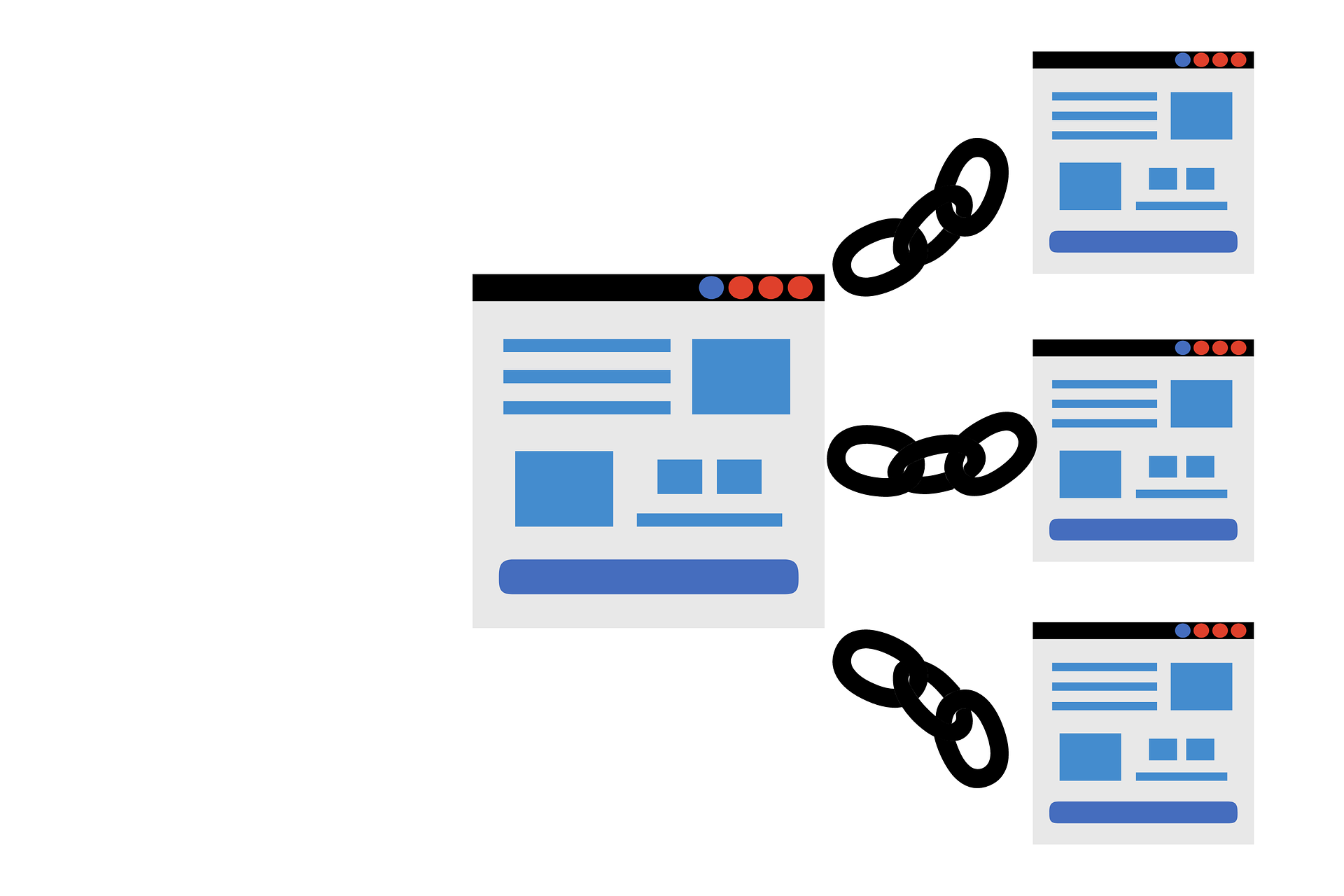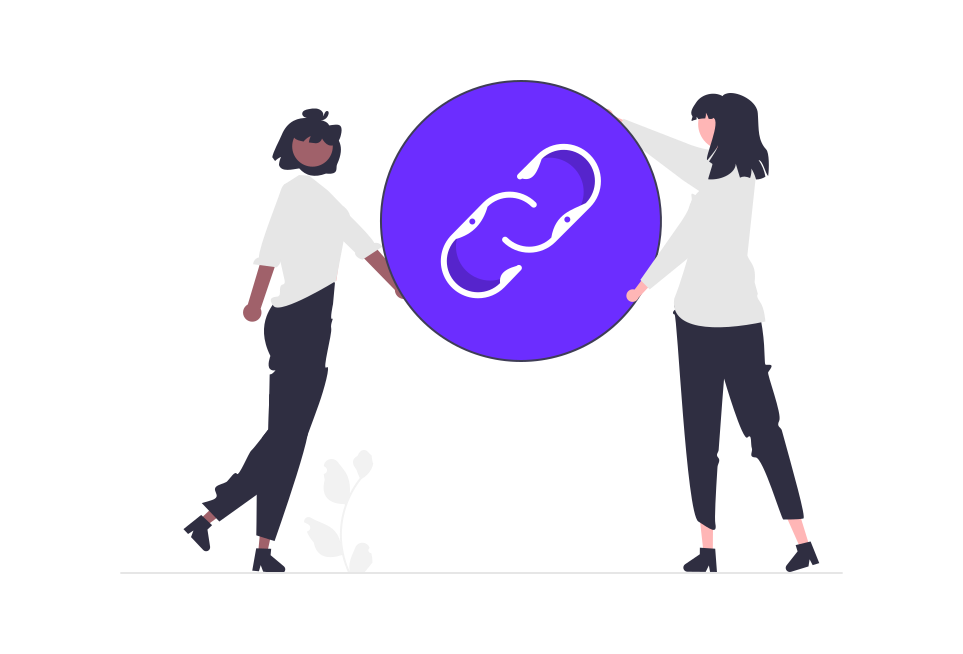Want to take your SEO game to the next level? It’s time to talk about the unsung hero of optimization: relevant backlinks. These little gems are like the secret handshake of the internet, telling search engines that your content is the real deal.
But what exactly are relevant backlinks?
They’re like the cool kids linking to your website because you’re in the same clique. In other words, they come from websites in your niche that are closely related to your content. It’s like having your BFF vouch for you – instant street cred!
When search engines see these relevant backlinks pointing to your site, they give you a virtual high-five and bump you up in the search results. It’s their way of saying, “Hey, this content is legit and people in the know are talking about it!”
Let’s talk more about this in this blog post.
What Are Relevant Backlinks?

Relevant backlinks, also known as inbound links, refer to backlinks that are closely related to the content on the websites that link to them. They are an important aspect of link building for SEO, which is the process of acquiring hyperlinks from other websites to your own. Link building is an essential strategy for improving your website’s visibility in search results. When search engines analyze your backlink profile, they consider the relevance of the websites linking to you.
What Are Niche Relevant Backlinks?

Niche relevant backlinks are highly valuable for SEO because they come from websites in the same industry as yours. When search engines see these backlinks, they recognize your content as relevant, trustworthy, and tailored to a specific audience within your niche.
Compared to generic backlinks, niche relevant ones provide more context and relevance to your site. Links from other websites in your niche signal to search engines that you have authority and expertise in your field. This can significantly boost your rankings in search results and drive targeted organic traffic to your website.
Acquiring niche relevant backlinks along side keyword research is a key strategy for successful SEO and content marketing for a said piece of content. They are considered more valuable than generic links because they establish your site as a trusted resource within your specific industry.
How To Get Niche Relevant Backlinks?

Acquiring niche relevant backlinks requires a strategic approach and careful planning.
Here are a few effective methods for obtaining niche relevant backlinks:
Use Pitching Tools Like HARO
Pitching tools like HARO help connect experts with websites and blogs that need their insights.
They’re free and offer many chances to get backlinks from relevant sites. Quality matters more than quantity, so focus on providing valuable contributions for better backlink opportunities.
Some recommended platforms include Connectively (formerly HARO), Help a B2B Reporter, Featured, Sourcebottle, and Qwoted.
Find Guest Posting Opportunities
Guest posting is a way to write for other websites and get a link back to your own site. It’s a great way to share your expertise, reach new audiences, and improve your website’s SEO.
To find guest posting opportunities, search Google using phrases like “write for us” along with your industry. You can also use terms like “contribute to” or “submit article” to find relevant websites.
Make sure the sites you choose are trustworthy and have a good domain authority along with a good number of links for better visibility and link benefits. Make sure this site is unique, has high quality backlinks and not just a link farm (a site made just for selling guest posts).
Create Innovative, High-Quality Content
Creating innovative and high-quality content is an effective way to attract niche relevant backlinks.
When you produce unique and valuable content, other websites within your niche are more likely to link to it. This can happen naturally as other content creators discover your content and find it valuable for their own audience.
To create good content, follow these tips:
- research well,
- give accurate data.
- Add visuals like pictures, graphs, videos for better user experience.
- Make content easy to share on social media for more views and backlinks.
- Keep updating your content to stay relevant and precise.
Pay Attention To Trends
Staying up-to-date with the latest trends in your niche can help you identify new opportunities for niche relevant backlinks.
Continuously monitor industry news, social media conversations, and search engine trends, you can discover topics that are currently in demand and create content around them. This can attract the attention of other websites within your niche, leading to valuable backlinks.
When creating content around trends, it is important to provide unique insights and perspectives in the type of content you are working on. This can help your content stand out and increase its chances of being linked to by other websites.
Use White Hat Link Building Techniques
When building niche relevant backlinks, it is important to use white hat link building techniques. White hat techniques focus on building high-quality, relevant backlinks that comply with search engine guidelines.
Here are some simple strategies to improve your website’s visibility and attract more visitors:
- Reach out to similar websites with good content for potential links.
- Write posts for respected sites in your industry, adding links back to your site.
- Create top-notch content that others will want to link to naturally.
- Work together with other creators to make valuable content as a team.
Why Is Link Relevance Important For Ranking On Search Engines?

Link relevance is crucial for ranking on search engines because it helps search engines like Google understand the context and content of your website.
When your site has relevant backlinks from other sites in a similar niche or industry, it signals to search engines that your content is trustworthy, credible, and authoritative.
Here’s why link relevance is important for ranking on search engines:
- Contextual Understanding: Link relevance helps search engines comprehend the theme and focus of your website. When your site receives backlinks from relevant sources, it reinforces the context of your content and the services/products you offer.
- User Intent: Relevant backlinks indicate to search engines that your site is providing valuable information that aligns with what users are searching for. This enhances user experience and satisfaction, which are key factors in search engine rankings.
- Credibility and Trust: Backlinks from relevant sites act as votes of confidence in your content. When reputable and related websites link to your pages, it enhances your site’s credibility and trustworthiness in the eyes of search engines and users.
- Quality Signals: Link relevance is a quality signal for search engines. Having links from relevant sites demonstrates that your content is valuable and authoritative within your niche, which can positively impact your rankings.
- Avoiding Penalties: Search engines penalize sites that engage in irrelevant or manipulative link-building practices. By focusing on link relevance, you can avoid penalties and ensure that your site maintains a strong and sustainable presence in search engine results.
How Do You Find a Niche-Relevant Backlink?

Google is a go-to for finding relevant websites in your industry. However, finding niche-specific links involves more than just a Google search.
Here are three effective strategies we recommend for discovering niche link opportunities:
Use Search Operators To Find Relevant Websites
One effective way to find niche-relevant backlinks is by using search operators in Google. Search operators are specific queries that refine your search and help you find relevant results more efficiently.
Here’s how you can use search operators to find relevant websites within your niche:
- Use the “intitle:[keyword” operator to find web pages with your keyword in the title.
- Use the “site:[website [keyword” operator to search a specific website for relevant content.
- Use the “inurl:[keyword” operator to find websites related to a specific keyword in the URL.
For example, if you have a blog about gaming pc cost, you can search for something like intitle:gaming pc.
Use The Competing Domains Feature On Ahrefs
Ahrefs is a popular tool for SEO and digital marketing tasks. It helps both experts and business owners track SEO progress, find keywords, and study competitors. A handy feature is Competing Domains, where you enter a competitor’s site and get a list of their linking sites, often related to your industry. Review their content for ideas and quality. While direct competitors might pose conflicts, exploring related sites for backlinks from your competitor’s website can boost your website’s authority.
Do a Backlink Intersect To See What Links Your Competitors Have That You Don’t
If your competitors are getting links from sites in your industry, you can probably do the same. Ahrefs has a tool called Link Intersect that helps us find industry-related websites linking to our rivals but not to us. After finding these sites, you can reach out to their owners and suggest linking to your content or create something helpful for them to link to.
What Makes a Link Relevant?
Link relevance is determined by several factors that contribute to the context and quality of the link.
Here are some key elements that make a link relevant:
Keywords
Keywords are crucial for link relevance to search engines. Choose anchor text with relevant keywords describing linked content.
Incorporating these keywords in anchor text and surrounding text helps search engines understand link context.
Search engines display most relevant results for users searching these keywords. Using relevant keywords in link building boosts link relevance and search result visibility.
Location
Location is vital for relevant backlinks, especially for local businesses. Operating in a specific area? Geo-relevant backlinks boost local SEO. These backlinks are from local sites or those related to your location, making them one of the most important types of links for businesses targeting a specific geographic audience. Search engines use these signals to assess relevance locally. Acquiring such backlinks enhances visibility in local searches and attracts targeted local traffic.
Backlink Profile
A website’s backlink profile is an important factor in determining the relevance of a link.
A strong backlink profile consists of high-quality, relevant backlinks from authoritative websites within the same niche or industry. Search engines analyze a website’s backlink profile to evaluate the website’s credibility and authority within its niche.
When a website receives backlinks from other relevant and authoritative websites, search engines interpret these links as valuable endorsements of the website’s content. This, in turn, positively affects the website’s rankings in search engine results pages (SERPs).
Anchor Text And Surrounding Context
Both the anchor text and surrounding context of a link are essential in determining its relevance. The anchor text is the clickable text that users see, while the surrounding context refers to the text surrounding the link, both on the linking page and the linked page.
The anchor text and surrounding context provide valuable context to search engines, allowing them to understand the relevance of the link to the content on both ends.
The Best Tools For Finding Relevant Backlinks
Finding relevant backlinks can be made easier with the help of various tools that provide valuable insights and data.
Here are some of the best tools for finding relevant backlinks:
- Ahrefs: Helps identify potential websites for backlinks and analyze a site’s authority.
- Moz Pro: Provides spam score metrics for safe linking and offers tools for broken link building.
- Semrush: Offers a backlink gap tool to compare backlink profiles with competitors.
- Google Search Console: Free tool for monitoring backlink profiles and website performance.
Which Backlinking Tool Is Right For You?
We suggest adding Google Search Console to your website because it helps improve your SEO and find any problems. You can also try Ahrefs, Moz, and Semrush for free to see which one works best for you.
Do Niche Edit Backlinks Work in Link Building?
Yes, niche edit backlinks can work in improving your SEO if they’re added naturally and are relevant to the existing content of a website. However, it’s important to remember that quality is more important than quantity in link building. Focus on getting links from trustworthy sources, and avoid using black hat link building techniques, to ensure the best results for your SEO efforts.
How Many Relevant Backlinks Do You Need For SEO?
The number of backlinks you need for SEO depends on various things. It’s not a set number because each niche and keyword competition is different.
Here are key points to consider:
- Competition: If your niche has tough competition, you’ll likely need more backlinks to rank well for popular keywords.
- Relevance: Backlinks from sites related to your niche are crucial. They show search engines that your content is connected to the topic, boosting your ranking potential.
- Authority: Links from high-authority sites are more valuable. They carry more weight with search engines, so fewer quality links can have a bigger impact than many low-quality ones.
- Quality over Quantity: Focus on quality over quantity. A few top-notch links can be more effective than many mediocre ones. Avoid low-quality links as they can harm your SEO efforts.
Example Of A Relevant Backlink
An example of a relevant backlink can be seen in a scenario where a fashion e-commerce website, Shein, receives a backlink from an authoritative website in the fashion industry, Elle magazine. If Elle magazine publishes an article featuring a specific fashion trend and includes links to the products on Shein’s website, this would be considered a relevant backlink.
In this example, the backlink is highly relevant because it comes from a well-known and respected fashion magazine, which is an authoritative source in the fashion industry. The article specifically talks about products available on Shein’s website, making the backlink contextually relevant to the linked content.
This relevant backlink can have a positive impact on Shein’s SEO efforts. Search engines, such as Google, consider backlinks from high-authority and relevant websites as endorsements of a website’s credibility and authority. When search engines see that Shein has relevant backlinks from a reputable fashion magazine like Elle, it increases the likelihood of Shein’s website ranking higher in search engine results pages (SERPs) for relevant fashion-related queries.
Example Of A Not-So-Relevant Backlink
An example of a not-so-relevant backlink can be seen in a scenario where a fashion e-commerce website, Shein, receives a backlink from a support forum for a code hosting and collaboration platform like GitHub. On the forum page, a user from Shein has posted a comment with a link to the company’s website.
In this example, the backlink is not-so-relevant because it comes from a support forum that is not related to the fashion industry. The forum’s purpose and subject matter have no connection to Shein’s expertise or products. As a result, this backlink is unlikely to contribute significantly to Shein’s rankings in search engine results pages (SERPs) for fashion-related queries.
It’s important to note that not-so-relevant backlinks may not have a negative impact on a website’s SEO, depending on the overall backlink profile and the authority of the linking website. However, relevant backlinks from high-authority and industry-specific websites tend to carry more weight and contribute to improved search engine rankings.
Should Every Backlink Be Relevant?
Not every backlink needs to be relevant, but having a majority of relevant backlinks is beneficial for SEO. Relevant backlinks can help boost a website’s authority and ranking, attract the right customers, and avoid search engine penalties.
However, it’s also important to have a diverse backlink profile, as links from a variety of sources can provide additional benefits.
How To Get Relevant Backlinks For Your Website?
To get relevant backlinks for your website, you can follow these strategies:
- Create high-quality, linkable assets like data-driven studies, guides, and infographics.
- Get featured on relevant resource pages by pitching your website.
- Find and replace broken links on pages within your niche.
- Use Google Search Console to analyze backlinks and find opportunities.
- Focus on getting links from high-authority pages and websites.
- Write relevant, competitive content that’s worth linking to.
- Use the Skyscraper Technique to create better content than competitors.
- Respond to HARO queries to earn links from reporters.
- Participate in online communities and share your expertise.
- Share content on social media to encourage natural linking.
- Reach out to influencers to share your content.
- Monitor brand mentions and request links when appropriate.
Types Of Relevant Backlinks

The types of relevant backlinks that can impact your SEO include:
- Organic Backlinks: These are natural links placed by real people on websites because they find the content valuable and beneficial for their audience.
- Editorial Backlinks: These are links placed within relevant, high-quality content that refer to your site. They are considered ideal backlinks as they are earned based on the quality and relevance of your content.
- Niche-Relevant Backlinks: Links from pages topically relevant to your site, especially from niche-specific websites, are crucial for establishing authority within your industry.
- Followed Links: Followed links are from high authority websites are highly valuable as they distribute link equity to your site’s target url and promote trust signals with search engines. These links do not have attributes like nofollow, sponsored, or ugc.
- Backlinks from Pages with Strong Backlink Profiles: Acquiring links from pages with strong backlink profiles can pass more link equity to your site, potentially improving your rankings.
- Guest Blogging Backlinks: By providing guest posts to well-established sites, you can include editorial backlinks to your own site, enhancing your site’s visibility and authority.
- Backlinks in Business Profiles: Creating digital profiles for your brand on business listing sites, social media platforms, and industry directories can provide opportunities to post backlinks, indicating that your site is well-established.
- Backlinks from Webinars: Webinars and their recordings offer valuable content for sites to link to, often embedding them in their pages along with a mention and link to your brand.
- Free-Tool Backlinks: Offering valuable tools for free can attract attention and backlinks, especially if the tool is useful to your target audience.
- Acknowledgment Backlinks: Brands often receive acknowledgments when making donations, sponsoring events, or having representatives speak at industry events, leading to backlinks from these mentions.
These types of backlinks play a crucial role in improving your website’s SEO performance by enhancing its authority, relevance, and visibility across search engines.
Best Practices for Trying to Get Relevant Links
When trying to get relevant links for your website, it is important to follow best practices to ensure the success of your link building efforts.
Here are some best practices to consider:
- Plan Your Link Building Strategy: Know what you want to achieve, how many links you need, and what kind of content you should create.
- Research Link Sources: Look for authoritative sites that fit your niche and check their metrics using tools like Ahrefs.
- Personalize Your Outreach: Reach out to websites with personalized emails and offer something valuable in return.
- Create Unique and Valuable Content: Focus on creating content that stands out and adds value to your audience.
- Build Relationships: Engage with websites in your niche through social media and online discussions to build lasting relationships.
- Avoid Competitors: Instead of targeting direct competitors, focus on blogs, publications, and related businesses in your niche.
FAQ’s:
Do Niche Backlinks Hold More Weight Than Generic Backlinks?
While niche backlinks are ideal for relevance and targeted traffic, generic backlinks from high-authority sites can still carry weight due to their domain authority and potential for broader exposure. However, the best approach is a blend: prioritize niche links for relevance and direct traffic, but don’t dismiss generic links, especially from reputable sources, as they can boost overall domain authority and credibility. Additionally, it is important to focus on the number of referring domains rather than just the number of backlinks, as this shows a wider range of sources linking to your website.
Can I Mix Niche Relevant Backlinks With Other Types?
Yes, it’s okay to mix niche-relevant backlinks with other types as long as they are from high-quality websites. Having a few links slightly outside your niche won’t hurt, but ensure that the majority are relevant to your industry to maintain a balanced and effective link profile.
How Can Local Businesses Focus On Acquiring Geo-Relevant Backlinks?
Local businesses can focus on acquiring geo-relevant backlinks by reaching out to other local websites, directories, and publications. By creating valuable content that showcases their local expertise and community involvement, they can attract links from relevant sources within their geographic area, such as news sites. This helps search engines understand the local relevance of their business and improves their visibility in local search results.
How Many Relevant Backlinks Do I Need To Improve My SEO?
The number of backlinks needed to improve SEO varies based on factors like the competitiveness of your niche, the authority of your website, the quality of your content, and the authoritativeness of your backlinks. There is no one-size-fits-all answer, but generally, you need more backlinks for competitive keywords and fewer backlinks for less competitive keywords. Quality outweighs quantity in backlinks, and a few highly authoritative backlinks can outweigh many low-quality links. Be cautious with the rate of backlink acquisition, as too many too quickly can be risky.
Can I Use Automated Tools For Finding Relevant Backlinks?
Yes, you can use automated tools to find relevant backlinks easily. These tools help identify quality websites to link to your site, monitor your backlink profile, and even analyze your competitors’ strategies for new link-building opportunities. Automated tools streamline the process, making it efficient and effective for improving your website’s search rankings.
Conclusion
To summarize it all, Relevant backlinks boost SEO. Niche links show expertise. Combined together, they help you rank higher and bring more visitors.
Focus on quality links. Use good methods. Write well and try HARO for good backlinks.
Get diverse relevant links for website success.
If you are on the look out for some top level SaaS links, Vh-info helps SaaS companies with link building goals effectively. Contact for personalized strategies and results.



